Going to Egypt solo? Joining our magical trip to Egypt? You’re in the right place.
In this article you will find travel tips for traveling to Egypt, especially as a solo woman, fun facts, movies and shows about the country, books you can read to go deeper into the culture, and so much more.
Be prepared for your trip with our Egypt travel tips and our packing list here, and get ready for a fabulous trip!
Below is a little history lesson on Egypt to better understand everything that has made Egypt what it is today. To skip right to our travel tips, click here!
A brief history of Egypt
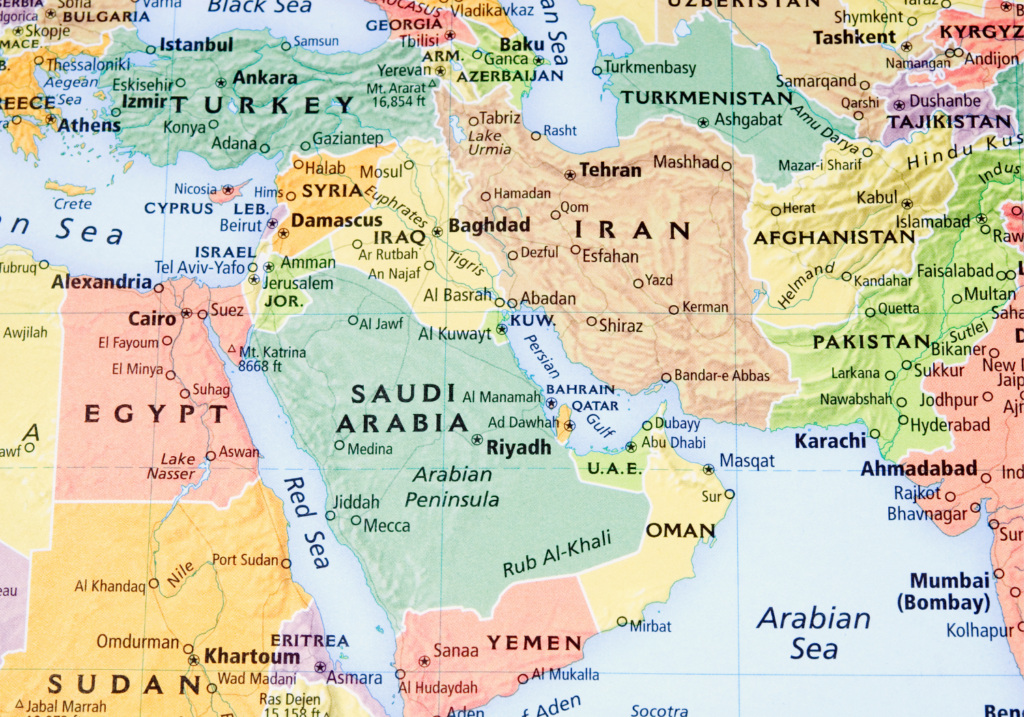
The history of Egypt, with its intricate tapestry of civilizations and influences, stands as a testament to the enduring resilience of this extraordinary land.
The country boasts one of the world’s oldest and most storied civilizations, with a rich history spanning thousands of years and typically divided into several key periods, each characterized by distinct cultural, political, and social developments.
Ancient Egypt (3100 BCE – 332 BCE):
Ancient Egypt is renowned for its monumental architecture, advanced understanding of mathematics and engineering, and a complex societal structure.
The unification of Upper and Lower Egypt under the pharaoh Narmer (c. 3100 BCE) marked the beginning of dynastic rule.
The Old Kingdom (c. 2686 BCE – 2181 BCE) saw the construction of the iconic pyramids at Giza, including the Great Pyramid of Khufu. The Middle Kingdom (c. 2055 BCE – 1650 BCE) witnessed the expansion of Egypt’s influence and the development of literature and art.
The New Kingdom (c. 1550 BCE – 1070 BCE) was an era of prosperity and military might. Pharaohs like Hatshepsut, Thutmose III, Akhenaten, and Tutankhamun left a lasting impact.
The reign of Ramses II (c. 1279 BCE – 1213 BCE) saw the construction of grand monuments, including Abu Simbel.
The decline of the New Kingdom ushered in the Third Intermediate Period and foreign invasions, culminating in the conquest of Egypt by Alexander the Great in 332 BCE.
Hellenistic and Roman Period (332 BCE – 641 CE):
Egypt became part of the Hellenistic world after Alexander’s conquest. The Ptolemaic Dynasty, established by one of Alexander’s generals, ruled Egypt for nearly three centuries.
Cleopatra VII, the last pharaoh of Egypt, famously aligned herself with Julius Caesar and later Mark Antony. However, after their defeat by Octavian (later Emperor Augustus) at the Battle of Actium in 31 BCE, Egypt became a Roman province.
Under Roman rule, Egypt thrived economically due to its fertile soil and strategic location.
The city of Alexandria, with its Great Library and renowned scholars, remained a center of learning. However, the spread of Christianity transformed the cultural landscape. Egypt became an early Christian stronghold, and monasticism flourished in the desert.
Islamic Period (641 CE – 1517 CE):
In 641 CE, Arab forces led by Amr ibn al-As conquered Egypt, marking the beginning of the Islamic era.
The Umayyad and Abbasid Caliphates exerted varying degrees of control, but local rulers, such as the Tulunids and Fatimids, often governed semi-autonomously.
The Fatimids founded Cairo in 969 CE, and Egypt became a center of Islamic civilization.
Saladin, a Kurdish military leader, rose to prominence in the 12th century and established the Ayyubid Dynasty. His conquest of Jerusalem in 1187 brought him international acclaim. The Mamluks, slave soldiers who eventually seized power, ruled Egypt from 1250 CE to 1517 CE.
Ottoman Rule (1517 – 1867):
The Ottoman Empire, under Sultan Selim I, defeated the Mamluks in 1517, bringing Egypt under Ottoman control.
Egypt became a vital province due to its agricultural wealth and strategic importance. However, by the 19th century, economic decline and European influence weakened the Ottoman grip.
Modern Egypt (19th century – Present):
In the 19th century, Muhammad Ali Pasha initiated modernization efforts in Egypt, focusing on military, economic, and administrative reforms.
The construction of the Suez Canal, completed in 1869, further transformed Egypt’s fortunes, albeit leading to increased foreign influence.
British intervention and the establishment of a protectorate in 1882 marked the beginning of Egypt’s colonial era.
Despite gaining nominal independence in 1952, Egypt faced political turbulence, including the nationalization of the Suez Canal in 1956, the Six-Day War in 1967, and the Camp David Accords in 1978.
The Arab Spring
In 2011, Egypt played a significant role in the Arab Spring, with massive protests and demonstrations that led to the ousting of longtime President Hosni Mubarak.
The Egyptian chapter of the Arab Spring unfolded in 2011 and brought about substantial political changes, although the aftermath has been marked by a complex and evolving political landscape.
President Hosni Mubarak had been in power for nearly 30 years, presiding over a regime known for its authoritarian rule, restrictions on political freedoms, and allegations of corruption.
Inspired by the success of the Tunisian revolution, Egyptians began protests on January 25, 2011, demanding political reform, economic improvements, and an end to Mubarak’s rule. The epicenter of the protests was Cairo’s Tahrir Square.
The protests intensified, leading to violent clashes between security forces and demonstrators. The government attempted to quell the unrest through curfews, shutting down the internet, and deploying security forces.
After 18 days of massive protests, Mubarak resigned on February 11, 2011. The military assumed control, and the Supreme Council of the Armed Forces (SCAF) took charge of the country, promising a transition to civilian rule.
The transitional period saw continued protests and political negotiations. Elections were held, leading to the rise of the Muslim Brotherhood and its political arm, the Freedom and Justice Party, whose leader, Mohamed Morsi, was elected as Egypt’s president in June 2012.
His presidency, however, faced challenges as Egyptians remained divided over the role of religion in politics. Amidst widespread protests against Morsi’s rule, military forces led by General Abdel Fattah el-Sisi intervened. In July 2013, Morsi was removed from power, and a transitional government was established.
General el-Sisi, who played a key role in removing Morsi, was elected as Egypt’s president in 2014. His presidency has been marked by a return to authoritarian rule and a crackdown on dissent.
Today, Egypt continues to play a significant role in regional geopolitics and remains a cultural and historical powerhouse. Its ancient wonders, vibrant cities, and the enduring legacy of its past continue to attract global fascination and as a large Muslim country at the cross-roads between Africa and the Middle East, it remains a role model for others.
Quick Egypt facts
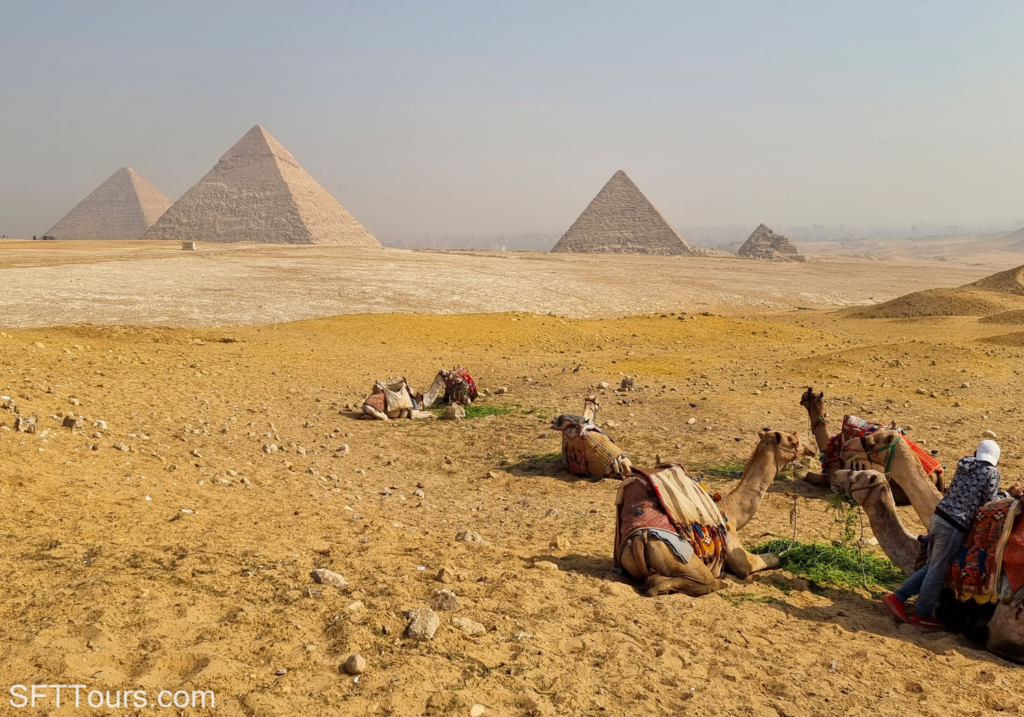
Below you’ll find some quick-fire facts about Egypt that may surprise you and that I am sure will help you get situated.
- As you probably know, Egypt is home to one of the oldest civilisations in the world, dating back to around 3100 BCE with the unification of Upper and Lower Egypt by King Menes. Most of what you will be visiting the country to see is several thousands of years old, and not a lot of countries can make this claim!
- The Great Pyramid of Giza is one of the Seven Wonders of the Ancient World and was built for Pharaoh Khufu around 2560 BCE. The Sphinx, located in the same pyramid complex, is half lion half Pharaoh and is one of the largest and oldest statues in the world. Egypt was home to another Wonder of the Ancient World, the Lighthouse of Alexandria.
- The ancient Egyptians used hieroglyphics, a system of writing that involved pictorial symbols. The Rosetta Stone, discovered in 1799, played a crucial role in deciphering these hieroglyphics. Nowadays, Egyptians speak Arabic.
- Tutankhamun, also known as King Tut, was an Egyptian pharaoh of the 18th dynasty. His tomb, discovered in 1922 by Howard Carter, was one of the most significant archaeological finds of the 20th century, however, as a king, he was unremarkable and died very young.
- There are 7 UNESCO World Heritage sites in Egypt most of which were added when UNESCO started the list in 1979. These include the ancient Christian city of Abu Mena, Ancient Thebes with its Necropolis (Karnac and Luxor Temples, The Valley of the Kings and the Valley of the Queens), Historic Cairo dating back to the 10th century and becoming the center of the Islamic world in the 14th century, Memphis and its Necropolis – the Pyramid Fields from Giza to Dahshur, Nubian Monuments from Abu Simbel to Philae in Aswan, Saint Catherine Area including the Orthodox Monastery of St Catherine at the foot of Mount Horeb where, the Old Testament records, Moses received the Tablets of the Law, and Wadi Al-Hitan (Whale Valley) in the Western Desert.
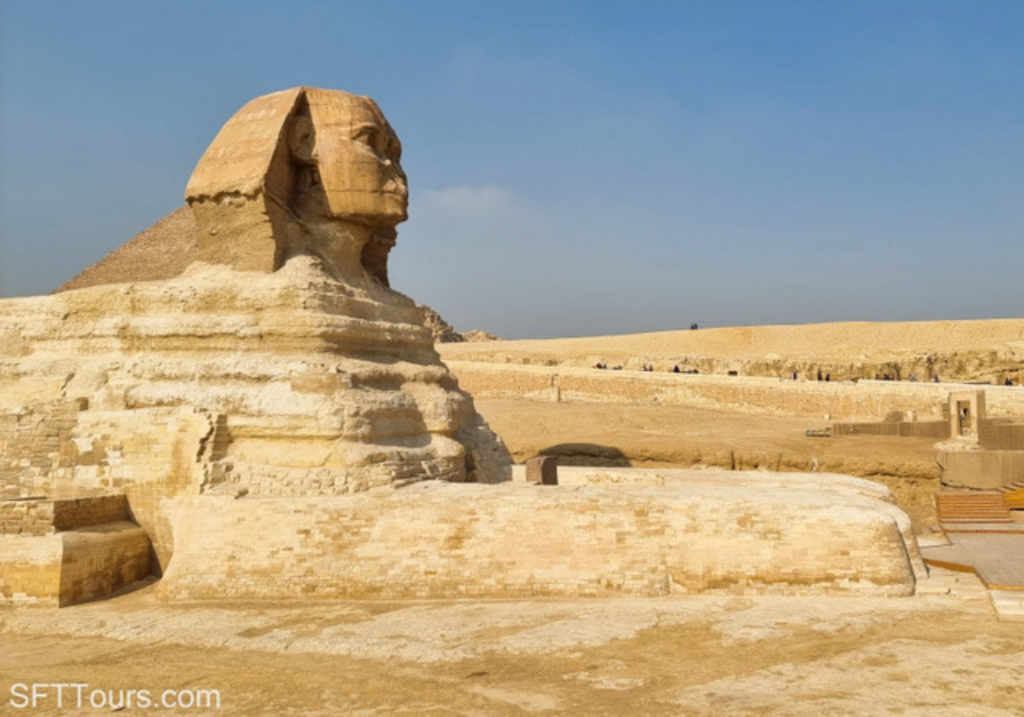
- Egypt’s capital, Cairo, is one of the largest and most densely populated cities in Africa and the world and often suffers from pollution as a result of car exhaust fumes. Traffic can be daunting and crossing the street an obstacle race.
- Although the majority of Egyptians are Muslim, around 10% of the population is Christian Coptic (though this number is contested), one of the oldest Christian denominations in the world, and celebrate Christmas in January.
- Much of Egypt is covered by the Sahara Desert, one of the largest hot deserts in the world, and the thriving civilizations which have existed in this part of the world for millennia have survived thanks to the Nile River, the longest in Africa and the source of water for agriculture and human sustenance.
- A lot of Egypt’s most famous ancient monuments and temples are also architectural and engineering feats. The Karnak Temple Complex, in Luxor, is one of the largest religious complexes in the world covering about 200 acres and includes the Great Hypostyle Hall with 134 massive columns.
- Ancient Egyptians invented a lot of modern day items such as the first paper-like material called papyrus, made from the pith of the papyrus plant. They were also early brewers of beer which had both religious and dietary significance. Beauty products such as kohl for eye makeup and perfumes made from natural ingredients like myrrh and frankincense were also first invented in Ancient Egypt.
- The Abu Simbel temples, built by Ramses II, were carved into the mountainside and relocated in the 1960s to save them from being submerged by the waters of Lake Nasser after the construction of the Aswan High Dam.
Egypt travel tips
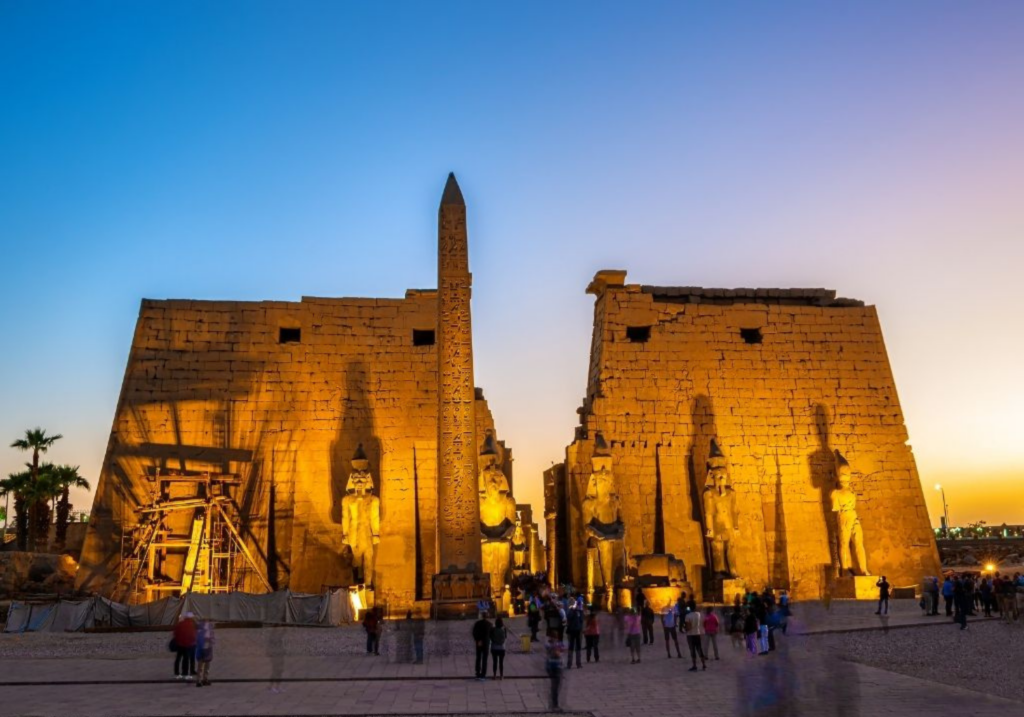
Egypt is a unique country that is probably quite different from the place you live in, and knowing a few basic rules and common practices will make your trip go much smoothly. Below are some travel tips I hope you’ll find useful.
Passports and Visa
- Process your visa in advance. Most Europeans and US passport holders can get an e-visa either in advance online or at the airport on arrival. The area of Sharm El Sheikh is visa-free so you don’t need a visa if you will only visit this Red Sea resort.
Visas can be obtained on the official Egyptian E-visa website and are usually granted quickly. Beware of scammers or any other website offering to process your visa at a cost higher than the official website.
Note: Since October 2023, Canadians need to obtain a full visa at the Egyptian embassy.
- Passport validity. Besides getting a visa, travelers to Egypt need to ensure they have a passport that is valid for 6 months after their departure and that has at least 1 blank page. You may also be asked for your return flight home.
Health and safety
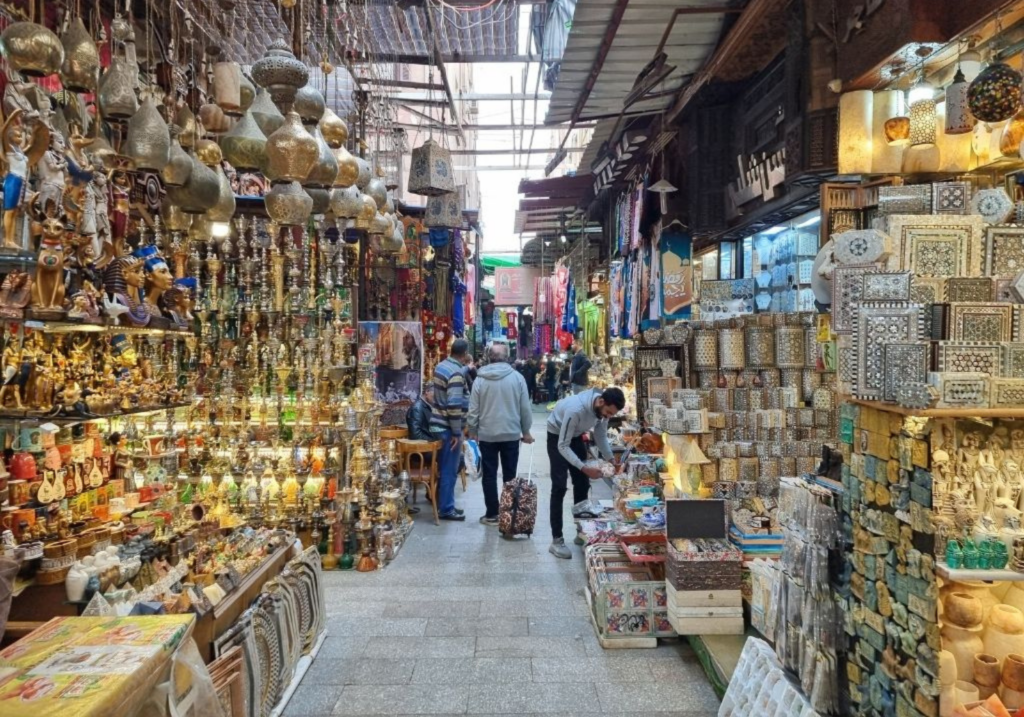
Heath and safety is important when traveling. Nobody wants to be sick overseas, and when traveling long distances, eating foods you are not used to and sleeping in a different environment, it is much more likely to be a bit under the weather.
Here are a few health tips to consider in general and for Egypt in particular.
- Get vaccinated in advance. Traveling to Egypt may also require you to take the necessary precautions to keep yourself safe from potentially deadly diseases.
Consult with your doctor ahead of the trip, at least 6 weeks before departure, so you leave enough time for the vaccines to take effect. Depending on where you live, some vaccines may not be immediately available from your GP and may have to be ordered.
The CDC recommends vaccination against COVID, hepatitis A and B as well as typhoid fever. Yellow fever is a requirement for entry in Egypt if you come from an endemic yellow fever area or have transited through an airport in a region where it is endemic.
It is also a good idea to check that you are up to date with routine vaccines such as chickenpox, tetanus, etc.
- Bring all the medication you’ll need. Most visitors to Egypt will stay in the popular and populated tourist areas where medical care is usually near and pharmacies available.
However, your specific medication may not exist in Egypt, or it may require a prescription you need to see a doctor for, save time and hassle by bringing everything you may need with you. Review what you should bring in your first aid kit here.
IMPORTANT: What may be legal in your country, or even sold over the counter, could be a controlled substance in Egypt and you may need permission from Egypt’s Ministry of Health before you arrive. If you do not have prior permission or the required documentation, the medication will not be allowed in and you may be prosecuted under Egyptian law. If you’re travelling with prescription medication, carry a letter from your GP that specifies your condition, the quantity of medication you will be carrying and that the medication is for your personal use only. Find more details here and contact the Egyptian Embassy for more clarity.
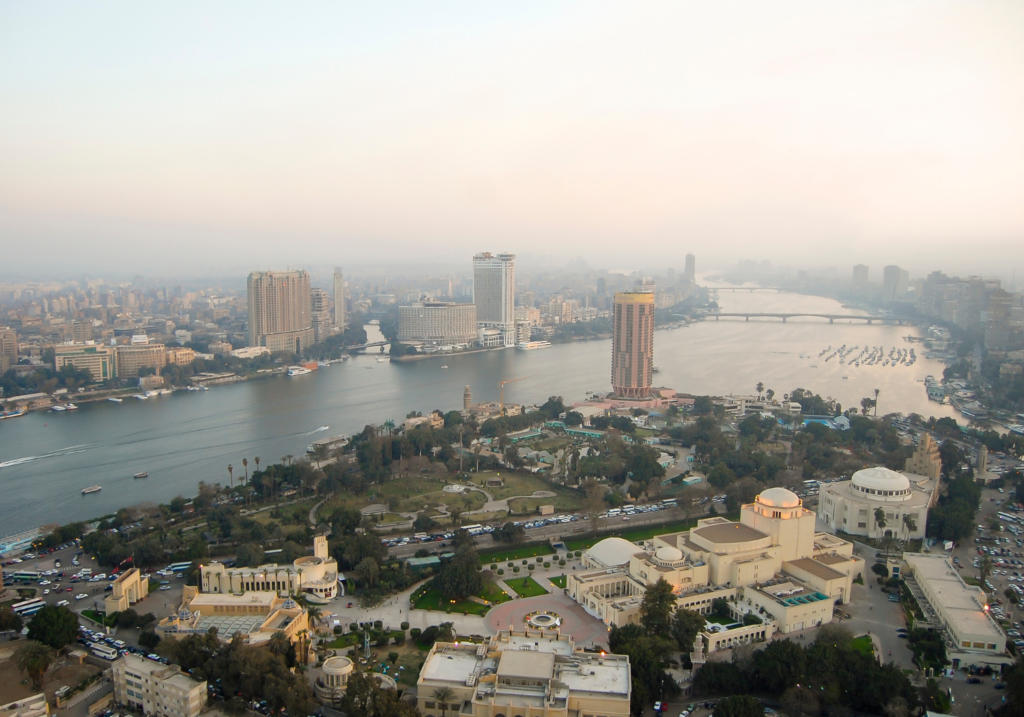
- ALWAYS get travel insurance. I never leave the house without purchasing extensive medical and travel insurance coverage and this is why we make it mandatory to join our tours, but in the case of Egypt this is extra important.
Most visitors to Egypt go on relatively relaxing trips that require a lot of walking but don’t typically involve adventure activities.
However, unexpected accidents do happen, and given the remote nature of some parts of Egypt, especially the Siwa Oasis, even the smallest of incidents may require medical evacuation, sometimes even on a medically-escorted flight. The cost of that could run in the hundreds of thousands.
I broke an arm falling from a horse in South Africa and my medical bill was $20,000 and a colleague of mine was stung by a stingray while going for an evening walk on the beach in Zanzibar and needed to be airlifted back to Dubai the cost of which ran into the 6 figures.
It’s worth noting that the best travel insurance will differ for each traveler, depending on the nature, style, and length of their trip, so I recommend using an aggregator and comparison tool such as Travel Insurance Masters to find the right one for you depending on what coverage you want, age, location, trip, etc.
- Toilets: If you are on a road trip across Egypt, you will unavoidably need to use a variety of public toilets, some of which may not have high standard of hygiene and cleanliness. Water and soap or even toilet paper may be lacking. Bring hand sanitizer, tissue, liquid soap and wet towels to wash your hands. You will also have to tip the attendant that is there keeping the toilets clean or handing toilet paper. Small change is good for this.
Note: Most toilets in Egypt will have a water hose instead of toilet paper as that is what the locals use.
- Crossing the road. Crossing the road anywhere in Egypt but especially in Cairo, is a fine art not to be messed with. The trick to do it, once you’ve waiting an unreasonable amount of time for cars to stop for you, is to start walking and do it at a constant pace so the cars / motorbikes can avoid you and drive around you. Or find the Tourism police and ask them to help you (they may expect a tip).
Note: Egyptians drive on the left so always look both sides.
- Register your trip with your travel embassy. Several countries offer support and updates for nationals traveling overseas.
The US has an online system to register your travels so they know to get in touch or locate you in case of any emergency such as a natural disaster. You can register on STEP here.
Australia offers a subscription service where you can get notifications of important news for the destination you are visiting. Subscribe here.
Other countries do not have online registration systems but you can always reach out to your local embassy in Egypt and let them know you’ll be in the country and your travel dates.
- Stay away from trouble. Avoid being in the vicinity of gatherings and protests as those are considered illegal in Egypt unless you have permission.
- Pollution and air quality. Cairo is a large and overpopulated city of 23 million people that has a serious air pollution issue caused by road traffic and agricultural slash and burn.
On a regular year, the levels of fine particulate matter PM10 and PM2.5 are several times the recommended levels by the WHO. While the Government is working to improve the problem, having a mask handy is useful, as is bringing any breathing aid solutions if you suffer from asthma or other respiratory issues.
- Police / military presence and check points. The safety of visitors is something that the Egyptian Government takes very seriously. Because of previous incidents that resulted in deaths and very negatively affected their tourism industry, the Government has in the past provided mandatory police / military escort for the drive to Abu Simbel (we fly instead) and other parts of Egypt.
All monuments and temples as well as tourist buildings such as hotels, have metal detectors and you will have to go through them multiple times a day in Cairo.
In the streets of Cairo, military and police presence is everywhere, especially around Tahrir Square, the epicenter of the Arab Spring.
There are many security check points along the main roads. There is nothing a tourist needs to do, they will usually just talk to the driver or maybe the guide and ask for paperwork.
At present time, it is mandatory for all tour companies to provide a detailed itinerary to the Government so they know where to find you at all times. Any changes to a group trip itinerary need to be updated and if they cannot be provided with enough notice, they cannot be implemented.
In some parts of Egypt, such as Siwa Oasis, which are safe but are close to the Libyan border, the police will follow your every move and typically call the driver at various times during the day to check in with you and your group. They may even have a car follow you around to ensure your safety. Their concern is for your safety. - Our Safety Index: When we conducted our first Solo Female Travel Survey, one of the most relevant take-aways was that women who travel solo unanimously worry about their personal safety. The best countries for first time solo female travelers all have safety in common. That’s why we created the first and most complete resource for women who travel solo to find safety information by country or destination.
With safety data coming from the US and UK Travel Advisories and the Global Peace Index, the index considers factors like the risk of theft, scam and harassment, as well as analyzing attitudes towards women in each country to rank each country from 1-4, 1 being the safest and 4 being the most dangerous for solo female travelers.
Egypt is currently rated as a relatively safe destination for solo female travelers on our safety index. Exercise caution and review our safety tips for solo female travelers to ensure you stay safe and have a rewarding and empowering travel experience.
Travel essentials for Egypt
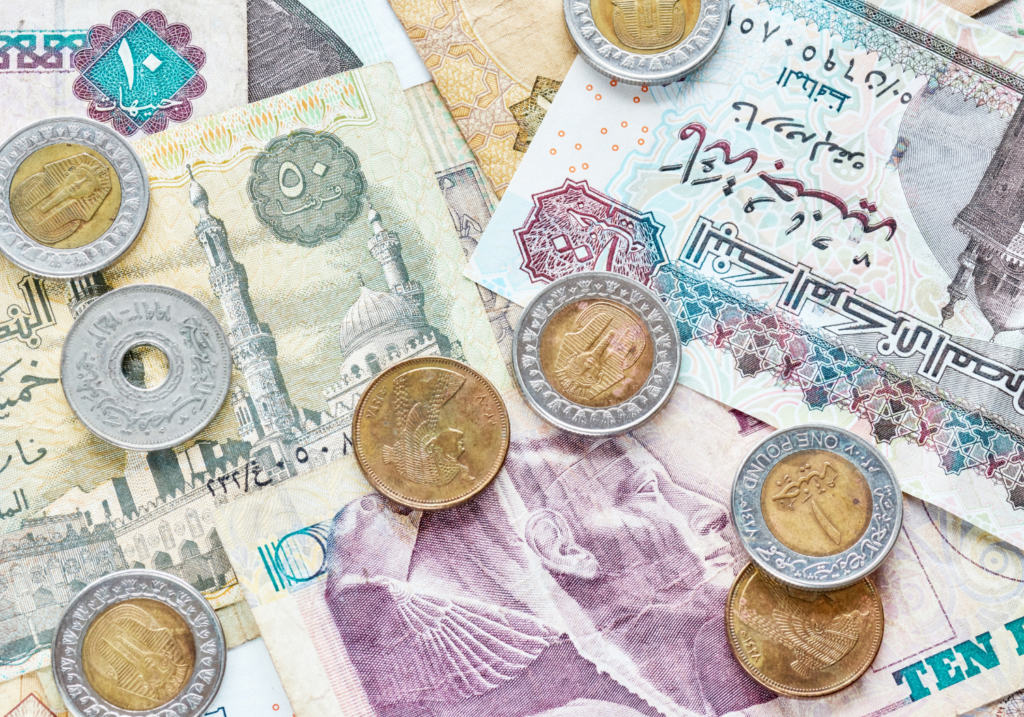
We’ve talked about health and safety but there are a few more Egypt travel tips to get through.
- Egypt uses the Egyptian pound as currency. US Dollars and Euro can be easily exchanged and ATMs are available across the country including at high end hotels like some of the ones we stay at (eg. Movenpick Aswan).
Credit cards will be accepted in many restaurants and hotels but will not be useful in smaller shops or street vendors. Entry tickets for many of the sites are almost always having to be paid in cash too (though this is changing). EUR / USD may be accepted in stores to buy larger items or souvenirs, especially USD, though change will be provided back in pounds. Have small change for tips and to buy smaller souvenirs.
- Stay connected if you must. While I advocate for a digital detox when on holidays, and a trip to Egypt is the perfect occasion to do so, if you wish to stay connected, you can buy a SIM card at the airport or an eSIM online like AloSIM or Airalo before your trip (you need internet to download the eSIM card).
Make sure your phone is unlocked by your telecom provider back home and for just a few dollars you’ll be able to share your experience on social media.
Tip: If you buy a local SIM card, let the store staff set it up for you before you leave the shop so they can enter any necessary APN settings.
- Don’t be fooled by the weather. The weather can change a lot from day to night and from the coast to the desert with variations of 10-15 degrees Celsius in the same day and even more in the deserts or Siwa Oasis. As soon as the sun sets, temperatures drop and sometimes, they catch travelers unprepared. Don’t forget to bring a jacket and scarf!
- Pack light. On any tour of Egypt such as our women-only tour, you are likely going to move around a lot either on a bus or minibus. This means changing accommodation several times and having to take other modes of transportation such as tuk tuks or boats to reach some of the hotels. While there will usually be staff ready to lend a hand, be mindful and pack light.
TIP: Go through our in-depth packing list for Egypt here, to make sure you’re prepared for everything!
Local culture and customs
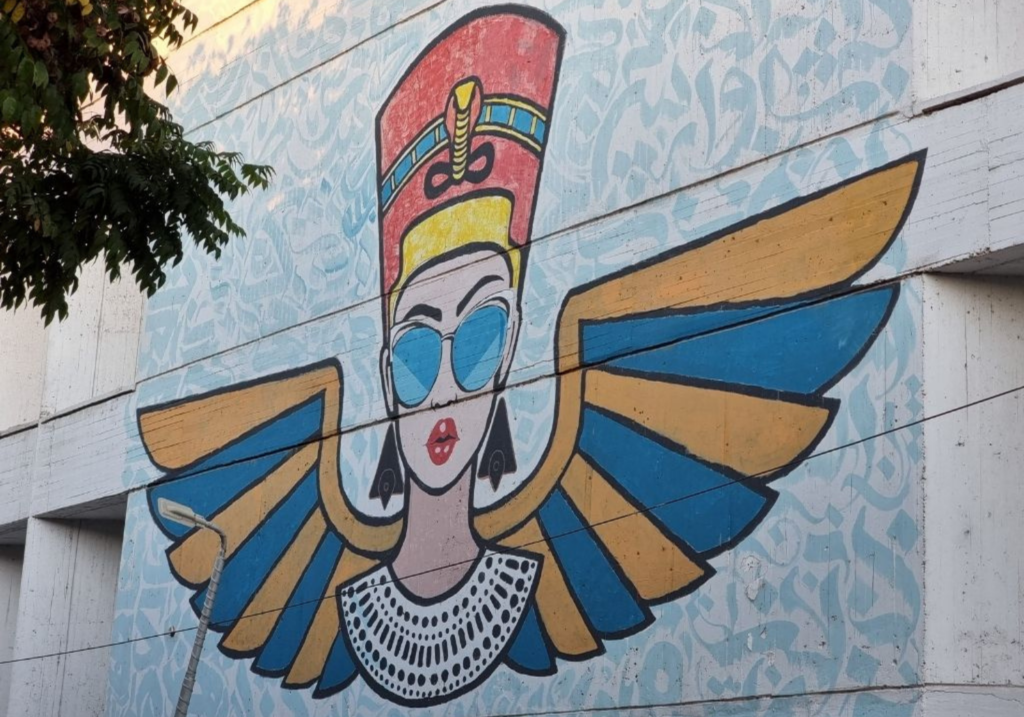
Our travel tips for Egypt would not be complete without talking about the local customs and culture in Egypt.
- Dress appropriately. Egypt is a generally conservative country where dressing conservatively will help you blend in and protect from the strong sun, sand and harsh weather of the desert. You do not have to cover your head in public, only when entering mosques.
Local women dress fashionably in the cities and more traditionally elsewhere. In the rural parts of the country it is more likely to see women wearing coveralls and headscarfs.
- Ask for permission not forgiveness. During your trip in Egypt, you will undoubtedly meet colorful locals, beautiful women, fascinating artisans and will find yourself in many situations where the scene is just stunning and worthy of capturing on a photograph.
While locals are always friendly and ready to chat, you should be mindful and ask before taking photographs. Never take photos of minors. You wouldn’t like a stranger taking photos of your child so don’t take photos of other people’s children.
Note: As I will discuss later under the tipping section, taking photos of something that belongs to someone or of someone will most likely result in them expecting a tip.
- Photography passes. While are on the topic of photos, know that many sites and tombs will require a photography pass in addition to your entry ticket, if you wish to take photos with a camera (not with a phone). Tripods cost extra.
- Learn some basic Egyptian Arabic. Knowing some basic words can be useful to communicate with the locals, show politeness and respect and even negotiate at the souks of the medina! I have included some basic words below.
- Right hand only. Use your right hand for dealing with people and to hand out things, especially food. Your left is used for using the toilet and is considered the “dirty” hand in Islam.
Useful Egyptian Arabic words
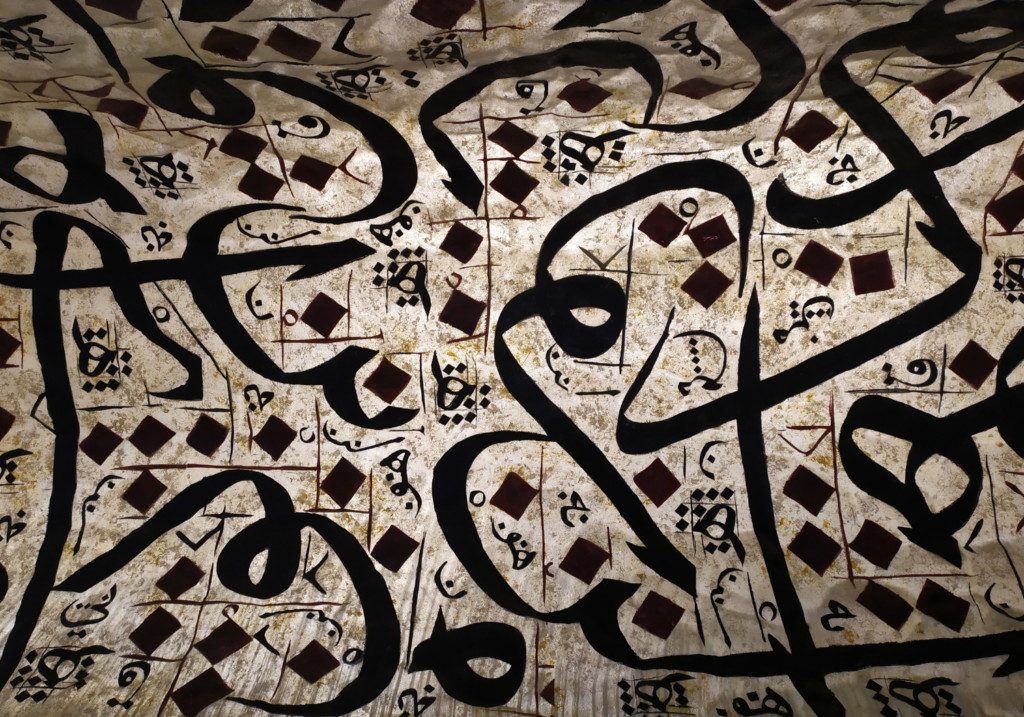
While Arabic is spoken in many countries in the world, every country has a different accent and dialect. Thanks to the movie industry and famous Egyptian singers, Egyptian Arabic is widely understood by most Arabic speakers and it is somewhat of a lingua franca in the region.
Below are some useful words for you to know:
- As Salaam Alaykum: “Peace be upon you”, used as a greeting or to say hello. The response should be “Walaykum As Salaam”, which translates as “and upon you too” but is a response greeting.
- Marhaba: Welcome.
- Na’am: Yes.
- La: No.
- Min Fadlak: Please.
- Shukran: Thank you. La, shukran for No, thanks.
- Ezzayak?: How are you?
- Alhamdullilah: “Thank God”, but used as a response to “how are you” to say that you are “good, thank God”.
- Afwan: Sorry / excuse me.
- Hammam: Bathroom.
- Maya: Water.
- Bikam da?: How much is this?
- Wada’an: Goodbye.
- Ana la afham: I don’t understand.
Tipping in Egypt
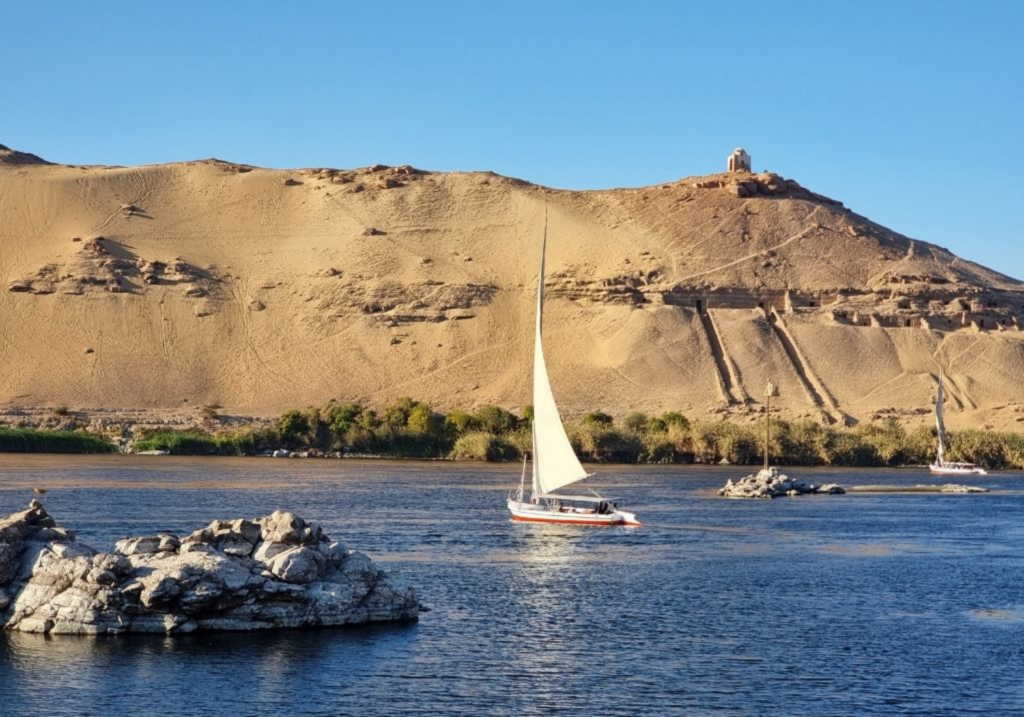
Tipping is always a personal decision based on the service you have received. However, tipping in Egypt is customary and expected in most interactions, including unwanted help offered in the streets or the markets in Cairo or someone taking your photo at a temple.
If someone offers to help you out, any kind of help, expect that they will ask for a tip with the word “backsheesh” which translates to “gift” in Arabic.
Below is a guideline for tipping:
- At restaurants and eateries, 10-15% tip is expected and you should round up at local cafes or street vendors.
- In group trips like ours or if you hire a guide for the day, we recommend 15-20 EUR per day as a good tip for a guide, and about 5 EUR per day for the driver. If the service has been exceptional, as is normally is in Egypt where hospitality is taken seriously, you could consider tipping more. If the service has been subpar or if you have been taken to shops you didn’t want to go to for “shopping opportunities” you could leave a lower tip or no tip at all. If you have booked a driver and guide for yourself alone, I would also suggest a more generous tip.
- Any kind of photography you take of something that belongs to or someone will attract a tip. If there is a camel, the owner will want a tip if you take a photo. If you take any kind of ride (boat, came, donkey, horse) a tip will be expected. 10% of the price is a good benchmark for this or small change for a photograph. Note: It is likely that in the case of a photo the person will ask specifically for an amount. You can haggle if it’s obscene, as it may be (eg. $10 for a photograph).
- Any information provided, even by employees of a museum or tomb or site will result in them asking for a tip.
Shopping opportunities you can’t get out of
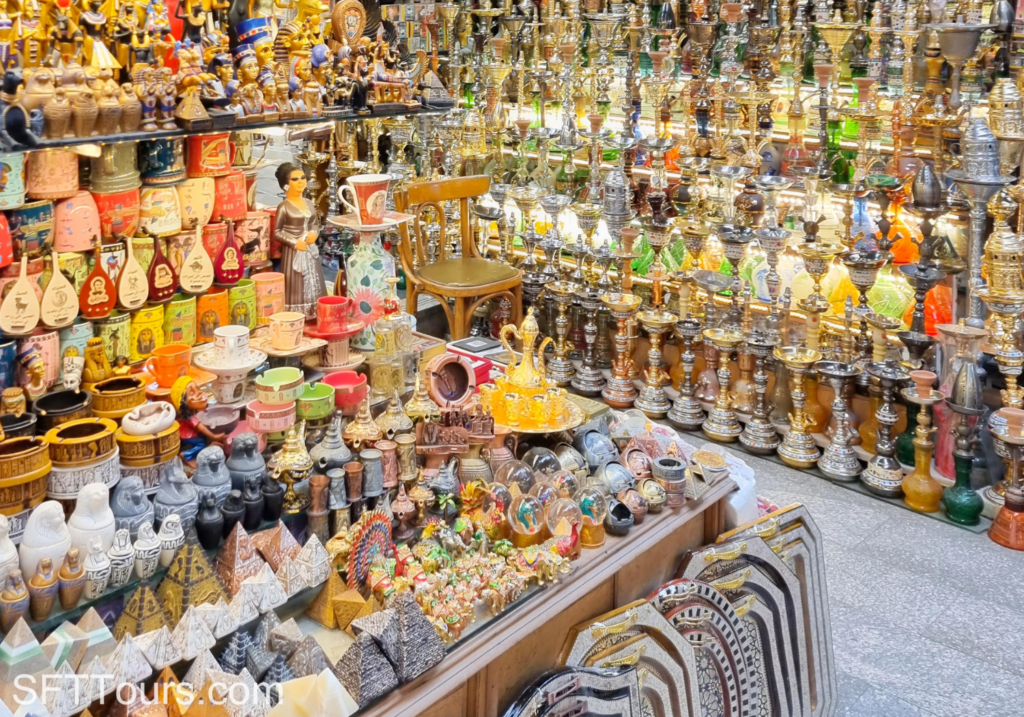
Shopping opportunities in Egypt are at a completely different level to any other country.
Yes, street harassment by vendors in the medinas in Morocco and the streets of popular tourist cities in India is overwhelming, but in Egypt this takes on a whole new meaning.
Unscheduled shopping stops
There are so many tourist traps and the tourism industry is so well developed that it is impossible not to end up in a perfume shop, a papyrus store, an alabaster workshop or a carpet shop. Even an experienced traveler like me with a very well rehearsed RBF ended up in more than one unscheduled shopping stop against my will.
It all starts with the guide asking if you have ever seen / heard of Egyptian XYZ [read: papyrus, alabaster, perfume, cotton, etc.]. You say no out of curiosity or because you genuinely don’t know what he means, and this is an invitation to stop at a place to “learn” more about it.
Each time, a long and involved demonstration and testing performance will follow during which you will not be able to leave and will be forced to participate by trying clothes, smelling perfumes or putting them on your skin, touching papyrus, seeing the staff create something for you only, etc.
Many store owners and staff will become extremely pushy and make you feel like your only way out is to purchase something.
You are in a back room with the doors closed, and even when you succumb and agree to buy, they will continue to upsell you into bigger, or more of the same.
Guides are in on it and will take you to their friend’s store who pays them a handsome commission. They won’t be helpful to understand prices or help you haggle and will disappear when the show starts leaving you alone with the very experienced sellers.
It is impossible not to fall prey to these situations as many guides will make their full time living wage from your purchases and can get quite upset if you do not buy anything.
From experience, the only way to avoid this is by being firm with the guide from the beginning of the day that you do not want to be taken anywhere that is not on your itinerary and if you do, refuse to enter these shops.
I have also had a frank conversation with my guide and told them that I am not interested in shopping and will not buy anything. If they take me to the places that are on my itinerary and do not deviate to shopping opportunities, I will tip them generously. A single store stop will result in me not buying anything and them not getting a tip, so it is in their best interest to not take me shopping.
If you hired the guide through an agency, you can also discuss this with them prior to the trip, though it is unlikely to stop the guides from doing this anyway. Everyone does it.
Street vendors
The other “threat” tourists need to be weary off are the pushy street sellers in the bazars and around all the main tourist sites. They will try to get your attention at every turn with an invitation to come into a store to “just have a look”. Sometimes, they may even grab your arm and gently pull you into their store.
Along will come a cup of hot tea followed by a well rehearsed performance that is designed to show you their best wares and entice you to purchase.
All of this is designed to make you invest in the experience so that you feel obligated to purchase something.
Unavoidably, visitors feel guilty for the time spent by the artisans unfolding many carpets, picking dozens of kaftans or explaining elaborate artisanal work or just want to leave an uncomfortable situation and feel compelled to purchase something.
A firm “La, shukran” (no, thank you) along with a not so friendly face, if you don’t want to get into a store usually suffices. Give them a smile or make eye contact and you will have given them a hint that you are kind and friendly and open to have a conversation, which is their way in.
Souvenirs to buy in Egypt
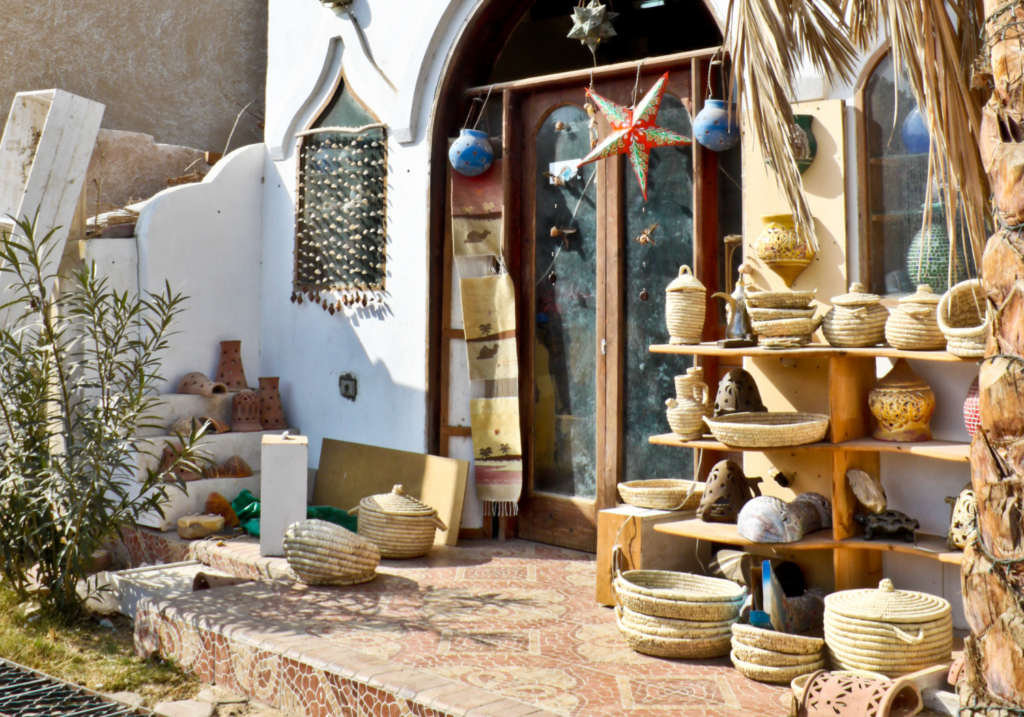
Trinkets and souvenirs are on sale pretty much everywhere in Egypt and you cannot visit any of the main sites without having to walk through a street vendor maze of stalls. You can find anything here, from replicas of busts of any of the Pharaohs to pyramid-shaped anything.
Most of these items will end up in your shelf at home without much attention paid to them, so I wanted to focus on things you can buy that may be useful or that are of higher quality than a keychain Sphinx.
Below is a list of the best souvenirs to buy in Egypt.
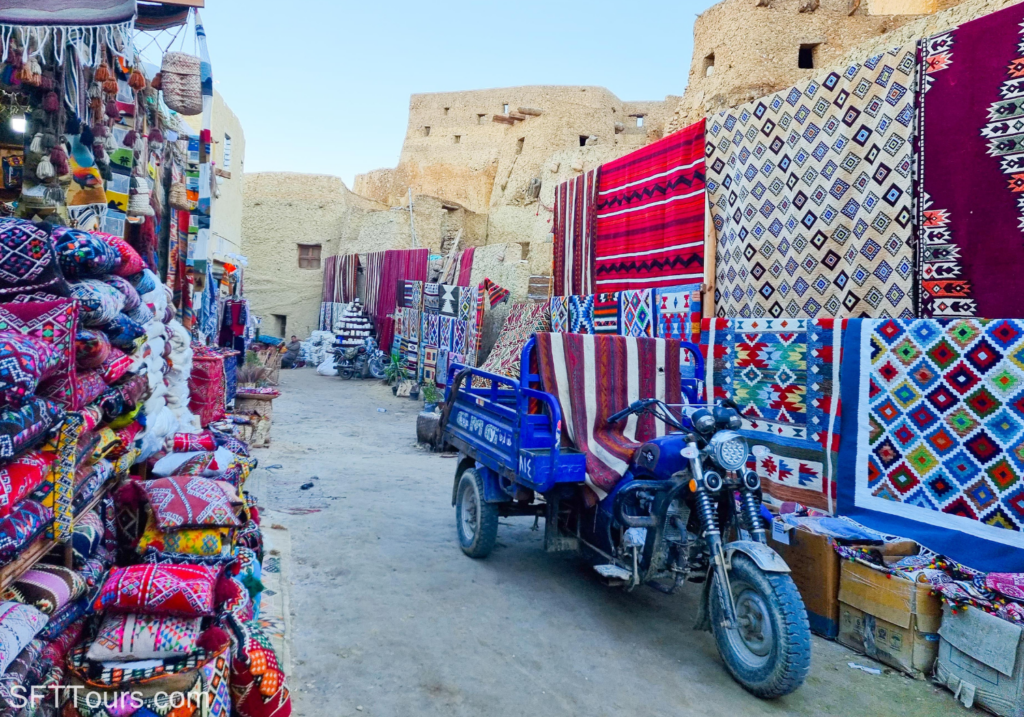
- Spices: Spices are an essential part of Egyptian cooking and are widely available for sale at the markets where they are displayed in sacks. Spices aren’t just used for cooking but also for medicinal purposes. While most of what’s on sale if available back home, I like to get hibiscus petals to make the delicious tea. Tip: Hibiscus tea pairs very well with bubbly for an alternative to a Sunday mimosa.
- Carpets and rugs: Carpets and bedouin rugs are a beautiful souvenir to take home. The bedouin ones have geometrical shapes and are for sale in Siwa.
- Egyptian cotton: The Nile River delta is home to a thriving cotton growing industry used as the benchmark for luxury bedding. During our trip, we will visit a female owned linen business to learn more about how you go from the plant to the threads and finished product.
- Copper items: As you walk through the markets, you will be mesmerised at the shinny copper trays and pots and the famous colorful lanterns which make for good souvenirs.
- Papyrus: Ancient Egyptians discovered the closest thing to today’s paper in the papyrus plant. You can find all sorts of decorative items made of papyrus across Egypt, from small bookmarks to larger paintings.
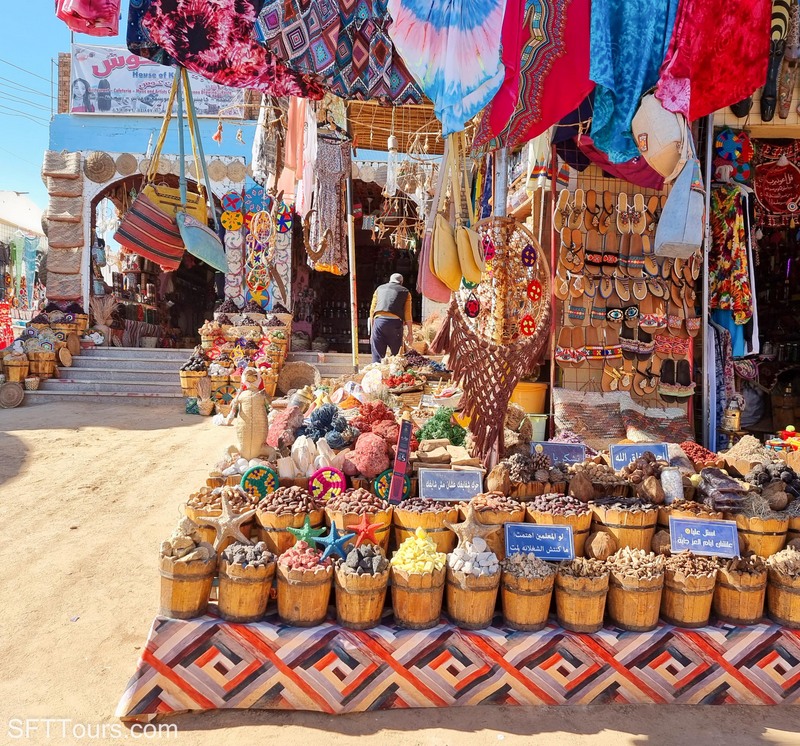
- Essential oils: Egypt is famous for its ancient essential oils which Ancient Egypt learned to extract. You can find these oils for sale across Egypt and they are often sold in small, intricate and pretty bottles that make for great gifts. You can haggle at the markets or check out the Nefertari stores.
- A scarab amulet: You probably associate the scarab with the desert and with Ancient Egypt and this is because it was worn as an amulet that represented renewal, rebirth and the sun god Ra. Scarabs are usually turquoise blue and come in all sizes, some of them for just a couple of dollars.
- Dates: Famous across Egypt and a very traditional food to eat especially during Ramadan. Dates are best bought from Siwa Oasis where there are date palm trees.
- Olive oil: Also from Siwa oasis, where olive trees grow, you can buy locally produced olive oil that is quite unique in taste.
- Weaved palm baskets: Like in many other countries where palm trees grow, Egyptians use the leaves to weave all sorts of useful items from baskets to decorative plates.
Local cuisine
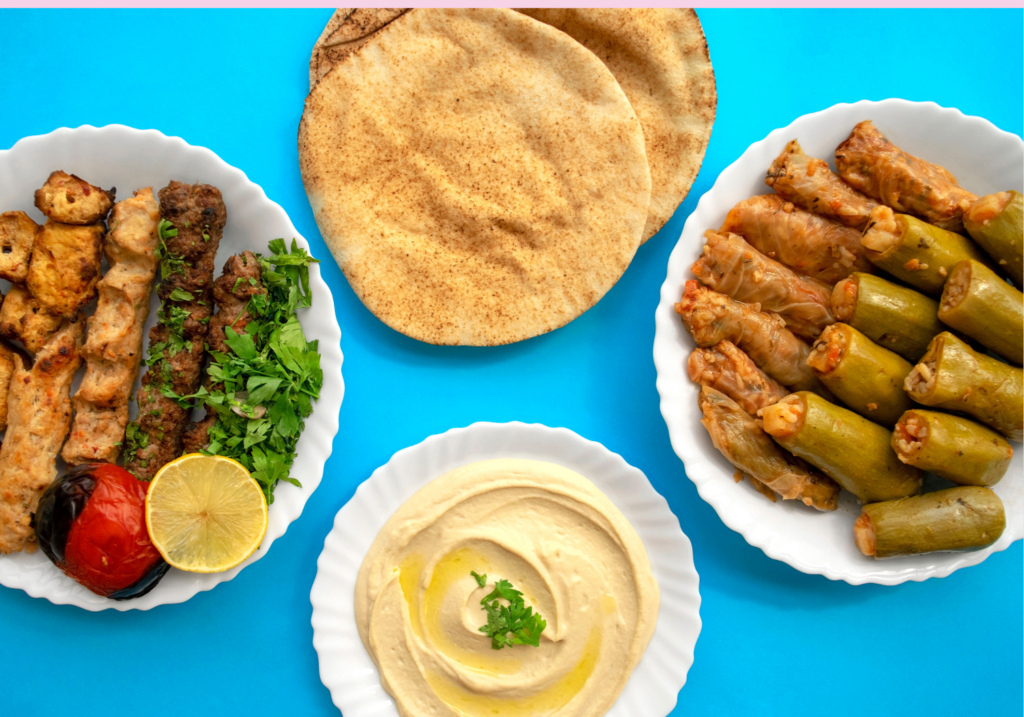
Egyptian cuisine is quite unique to the country and typically only found here, although some dishes are also widely available in other Mediterranean and Arab countries.
The gastronomy is the result of the country’s location at the trading crossroads of so many ancient empires such as the Ottoman Empire, the Persian culture and the Mediterranean (Greek and Roman) influence.
During our women only tour in Egypt we will enjoy lots of different kinds of foods and will also go on a food walking tour to explore the food culture.
Egyptians tend to eat with their hands though forks and spoons are always offered and used. Flat bread accompanies every meal and is used to scoop food. The right hand is the only hand used to eat, as the left is dirty in Islam.
A meal will typically have a few starters and dips called mezze which can be hot or cold and are served to share and accompanied with bread followed by hot dishes such as grilled meat or fish.
Besides bread, Egypt also grows rice in the Nile River delta and this is another staple food accompanying a lot of the meals.
Alcohol is available in hotels and some restaurants but you will not find it in casual eateries, street food stalls or markets.
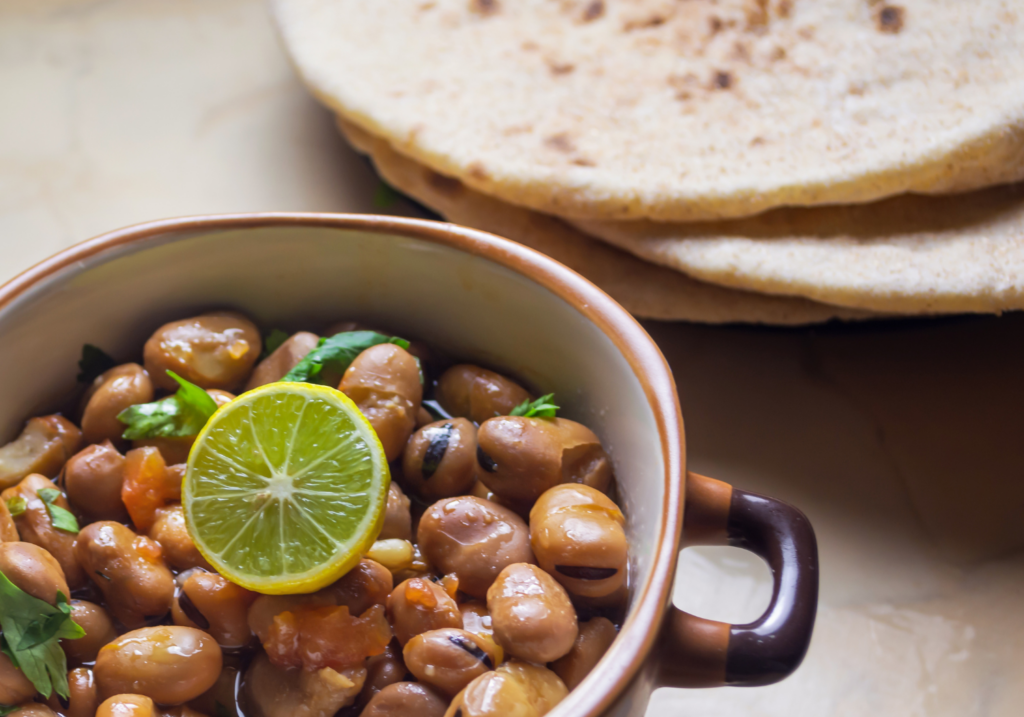
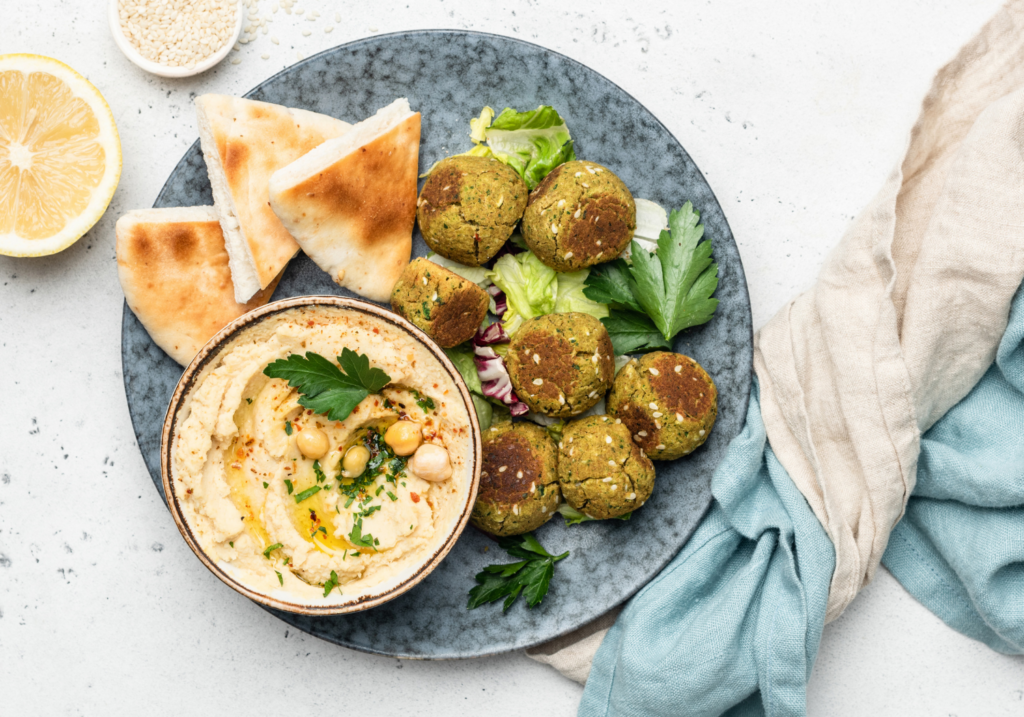
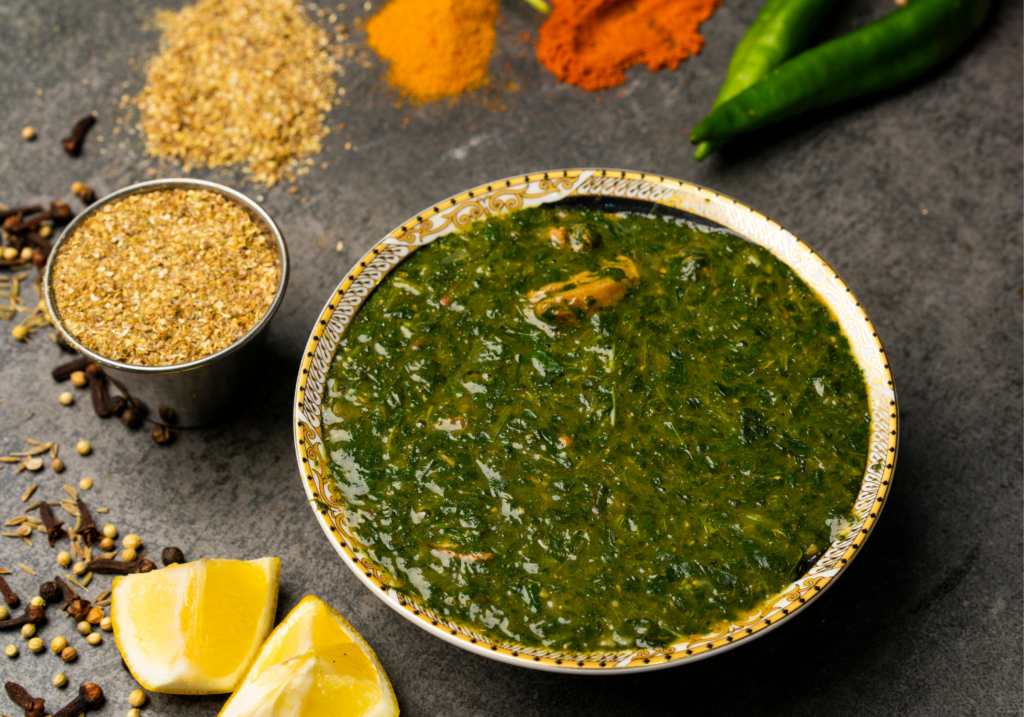
- Ful medames (fava bea stew). This is perhaps the most famous Egyptian dish and it consists of fava beans stewed and eaten for breakfast, similarly to how the British eat baked beans with their full English breakfast.
- Baladi bread. Aish Baladi, or simply baladi bread, is a type of flatbread that is a staple in Egyptian cuisine. It is often served with various breakfast items, used for dipping, or as a wrap for ingredients like ful medames.
- Hummus. A dip made from mashed chickpeas, tahini, olive oil, lemon juice, and garlic. Almost every Middle Eastern country will argue they have the best hummus and Egypt is no exception.
- Molokhia. Molokhia is a green, leafy vegetable similar to spinach that is often cooked into a soup with garlic, coriander, and sometimes meat (chicken, rabbit, or beef). It is typically served with rice or bread.
- Falafel. Deep-fried balls made from ground fava beans or chickpeas, often served in sandwiches. The difference between falafel in Egypt and in other parts of the Middle East is that Egyptian falafel is usually made with ground fava beans instead of chickpeas.

- Koshari. A popular street food made with rice, macaroni, lentils, chickpeas, and fried onions, topped with a spicy tomato sauce. This is comfort food at its best.
- Labneh. Strained yogurt that resembles a soft cheese. It is commonly spread on bread and may be drizzled with olive oil or served with tomatoes and cucumbers.
- Baba ganoush. My most favorite mezze made of roasted eggplant dip mixed with tahini, garlic, and lemon juice.
- Kebabs and shawarma. Grilled or roasted meats, often served with rice, bread, and a variety of sauces. This is a popular street food and also a staple on every menu.
- Mahshi. Meaning stuffed in Arabic, this is a dish that combines rice, herbs, and sometimes minced meat stuffed inside any vegetable such as courgette, vine leaves or bell peppers. This is also eaten in Greece, Lebanon and other Mediterranean countries.
- Grilled Fish. Given Egypt’s coastline along the Mediterranean and Red Sea, fresh seafood is readily available, and grilled fish is a popular choice. By the Nile River, river fish is also widely available.
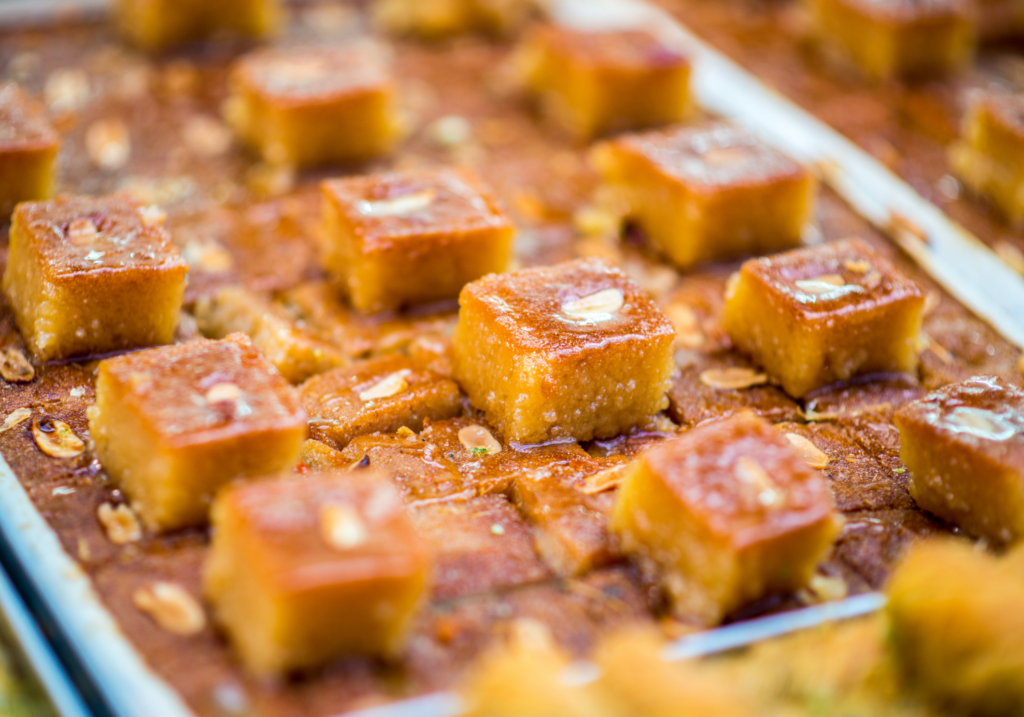
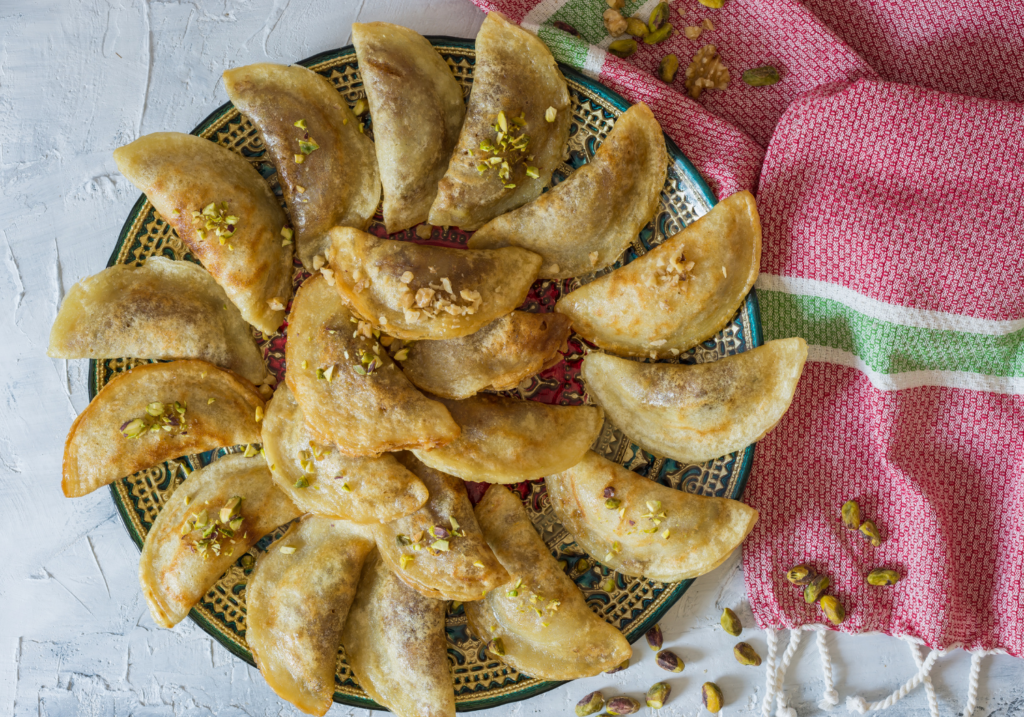
- Konafa. A dessert made from thin noodle-like pastry soaked in syrup or honey, often layered with nuts.
- Fiteer. A type of Egyptian pastry, often filled with savory or sweet ingredients.
- Basbousa. A sweet semolina cake soaked in sugar syrup, often garnished with coconut or nuts.
- Qatayef. Sweet dumplings filled with nuts or sweet cheese, traditionally served during the month of Ramadan.
- Hibiscus Tea (karkadeh). A popular herbal tea made from dried hibiscus flowers. It can be served hot or cold and mixed with lemonade.
- Egyptian coffee. Strong, thick coffee served in small cups, it resembles Turkish coffee.
Books about or set in Egypt
We could write a really long list of books about Egypt, from Ancient civilisation to the Pharaohs and all the incredible monuments and sites in the country. Below are some recommendations for inspiration, historic and interesting reads.
- When Women Ruled the World: Six Queens of Egypt – K. Cooney: A journey through all the female pharaohs of Egypt from Hatshepsut to Cleopatra.
- Midnight in Cairo, The Divas of Egypt’s Roaring ’20s – R. Cormack: A feminist take on the women who took over Egypt’s entertainment industry by the horns in the 1920s and 1930s.
- The Complete Gods and Goddesses of Ancient Egypt – R. H. Wilkinson: Everything you need to know to understand who the good, bad and ugly deities of Ancient Egypt were and how they were worshipped. The guide you need to carry with you everywhere.
- Death on the Nile – A. Christie: Mystery murder book that takes place on a cruise down the Nile River and was also made into a Hollywood movie.
- Taxi – K. Al Khamissi: A collection of 58 short stories taking place in Cairo and told by taxi drivers in this crazy and buzzing city.
- The Cairo Trilogy – N. Mahfouz: A classic work of Egyptian literature, this trilogy (“Palace Walk,” “Palace of Desire,” and “Sugar Street”) provides a multi-generational portrait of an Egyptian family against the backdrop of historical events during the early 20th century.
- The Yacoubian Building – A. Al Aswany: This novel offers a complex and engaging narrative, weaving together the lives of the diverse inhabitants of a Cairo apartment building. It explores societal and political issues in modern Egypt.
- River God – W. Smith: The first book in the Ancient Egypt series, “River God” is a historical novel set in ancient Egypt. It follows the life of Taita, a slave who becomes a trusted advisor to the Pharaoh.
- Nefertiti – M. Moran: This historical novel is a fictionalized account of the life of Nefertiti, the queen of ancient Egypt. It provides a vivid portrayal of the court and politics during the 18th Dynasty.
- The Map of Love – A. Soueif: Set in both contemporary and colonial Egypt, this novel tells the story of an Egyptian woman’s discovery of her grandmother’s journal and explores themes of love, politics, and identity.
- The Rise and Fall of Ancient Egypt – T. Wilkinson: A well-researched and accessible history, this book provides a chronological account of ancient Egyptian civilization, from its early days to the conquest of Alexander the Great.
- The Looming Tower: Al-Qaeda and the Road to 9/11 – L. Wright: This Pulitzer Prize-winning nonfiction book provides an in-depth look at the history of radical Islamism, including the influence of the Muslim Brotherhood in Egypt.
Movies about or shot in Egypt
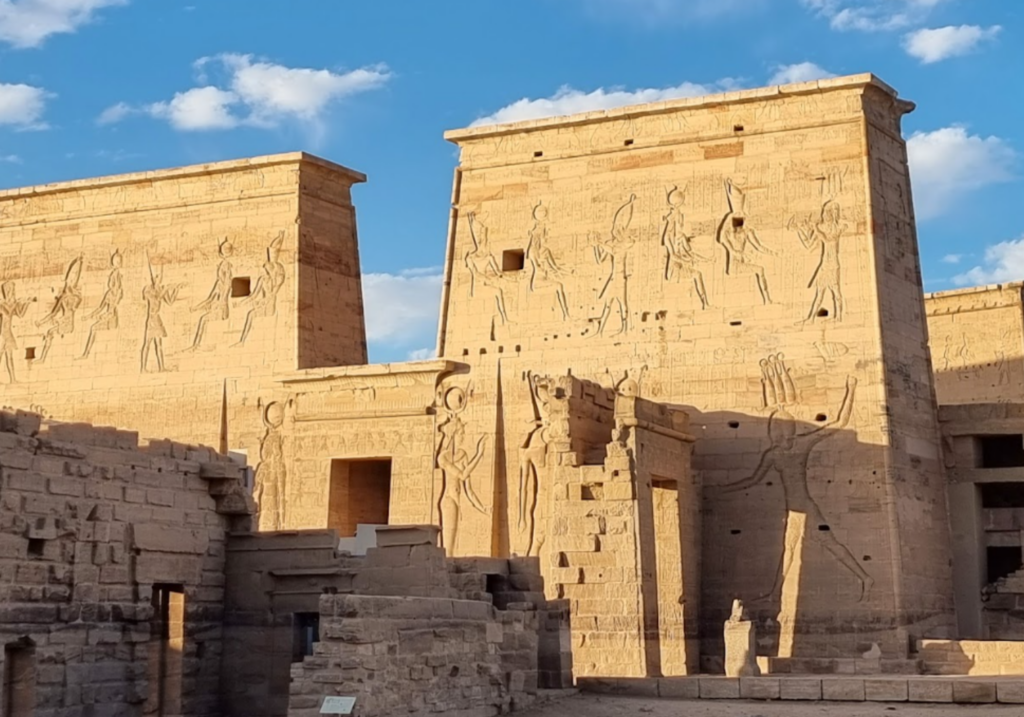
Ancient Egypt has always captivated the imagination of writers and movie producers so it should come as no surprise that it is featured in many fantastic and adventure movies.
Below is a list of documentaries, movies and shows you can watch to learn more about Egypt or simply marvel at its beautiful landscapes.
- Lawrence of Arabia – Directed by David Lean, this epic film tells the story of T.E. Lawrence’s World War I experiences in the Arabian Peninsula, including scenes filmed in Egypt.
- The Mummy – The movie is set to take place in Egypt but it was in fact filmed in Marrakech and at a movie set in Erfoud which was also used by James Bond’s Spectre.
- The English patient – Based on the novel by Michael Ondaatje, this romantic drama is set in North Africa during World War II and includes scenes set in the deserts of Egypt.
- Cairo Station – Directed by Youssef Chahine, this classic Egyptian film explores the lives of characters working at Cairo’s main railway station, offering a glimpse into the social dynamics of the time.
- The Night Manager (TV series) – While primarily set in various locations around the world, including Egypt, this espionage thriller includes scenes filmed in Cairo and the Sinai Peninsula.
- Omar Sharif’s: The Ten Commandments – A documentary featuring Omar Sharif as he explores the real historical figures and events behind the iconic film “The Ten Commandments” (1956), which was partially shot in Egypt.
- The Square – An award-winning documentary by Jehane Noujaim that provides an intimate look at the Egyptian Revolution of 2011 and the subsequent political unrest in Tahrir Square. It was nominated for an Oscar the Best Documentary Feature in 2014.
- The Blue Elephant – An Egyptian psychological thriller based on the bestselling novel by Ahmed Mourad. The film follows a psychiatrist as he investigates mysterious events related to a former patient.
- The White Knights – Directed by Joachim Lafosse, this Belgian-French drama is set in an unnamed African country (filmed in Egypt) and follows a humanitarian organization facing moral and ethical dilemmas.
- Aida – This film adaptation of Giuseppe Verdi’s opera “Aida” is set in ancient Egypt and tells the tragic love story of an Ethiopian princess and an Egyptian military commander.
- The Spy Who Loved Me – While part of the James Bond series, this film includes scenes set in Egypt, including the iconic sequence where Roger Moore’s Bond visits the Pyramids.
- Luxor – Starring Andrea Riseborough, this drama tells the story of a British aid worker who returns to the city of Luxor, Egypt, and confronts her past while wandering through its ancient temples.
